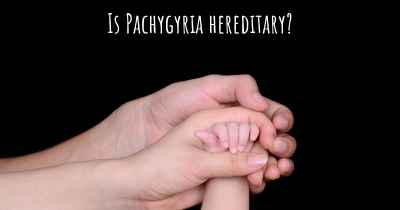What are the best treatments for Pachygyria?
See the best treatments for Pachygyria here

Treatments for Pachygyria
Pachygyria is a rare neurological disorder characterized by an abnormally thick cerebral cortex with reduced number and depth of brain folds. It can lead to various developmental delays and neurological symptoms. While there is no cure for pachygyria, several treatments and interventions can help manage the symptoms and improve the quality of life for individuals affected by this condition.
1. Medications
Medications are often prescribed to manage the symptoms associated with pachygyria. Seizures are a common symptom, and antiepileptic drugs (AEDs) are typically prescribed to control and reduce the frequency of seizures. The specific medication and dosage will depend on the individual's needs and response to treatment. Regular monitoring and adjustments may be necessary to achieve optimal seizure control.
2. Physical and Occupational Therapy
Physical and occupational therapy play a crucial role in managing the physical and developmental challenges associated with pachygyria. Physical therapy focuses on improving motor skills, muscle strength, coordination, and balance. Occupational therapy aims to enhance daily living skills, fine motor skills, and cognitive abilities. These therapies are tailored to the individual's needs and can significantly improve functional independence and overall quality of life.
3. Speech and Language Therapy
Speech and language therapy is essential for individuals with pachygyria who experience difficulties with speech and communication. A speech-language pathologist can assess the individual's abilities and develop a personalized therapy plan. This may include exercises to improve articulation, language comprehension, and alternative communication methods such as sign language or augmentative and alternative communication (AAC) devices.
4. Assistive Devices
Assistive devices can greatly enhance the independence and mobility of individuals with pachygyria. These devices may include wheelchairs, walkers, orthotic braces, or other adaptive equipment. The selection of assistive devices depends on the individual's specific needs and abilities, and it is important to work with healthcare professionals to determine the most suitable options.
5. Supportive Care
Supportive care is crucial for individuals with pachygyria and their families. This may involve a multidisciplinary approach, including regular check-ups with healthcare providers, genetic counseling, and access to support groups or community resources. Supportive care aims to address the physical, emotional, and social needs of individuals with pachygyria and their families, providing them with the necessary tools and support to navigate the challenges associated with the condition.
It is important to note that the effectiveness of treatments may vary depending on the severity of pachygyria and individual response. Early intervention and a comprehensive treatment plan tailored to the individual's needs are key to maximizing outcomes and improving quality of life.
Posted Feb 27, 2018 by Lesley 500








